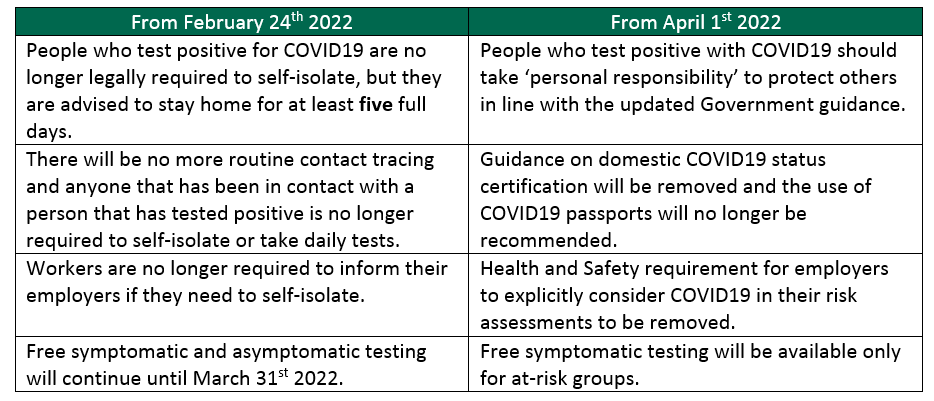
The Government has confirmed that it has updated its COVID‐19 guidance from today(1 April) to advise anyone who tests positive to ‘try to stay at home and avoid contact with other people for five days’. In line with the Living with COVID‐19 plan, the Working Safely During Coronavirus guidance and the health and safety requirement for employers to explicitly consider COVID‐19 in their risk assessments, are due to be withdrawn from 1 April, and the Government will be publishing ‘principles that employers can follow to help them decide how to reduce risks in the workplace’.
The Prime Minister has announced the Government’s Living with COVID‐19 plan, which will see the remaining coronavirus restrictions in England lifted from today (24 February). Emphasising the need to ‘begin to treat COVID‐19 as other infectious diseases such as flu’, the Government has confirmed the restrictions will be withdrawn as follows although the updated guidance has not yet been published:

[su_spoiler title=” Is there any guidance for paying SSP for Covid related absence?” open=”no” style=”default” icon=”plus” anchor=”” class=””]
Statutory Sick Pay (SSP) Rebate Scheme has been reintroduced on the 21st December. The Scheme allows business with fewer than 250 employees to claim the cost of SSP for COVID-related absences for up to two weeks per employee.
Claims can be made retrospectively from mid-January.
[/su_spoiler]
[su_spoiler title=”Do I still need a COVID Risk Assessment?” open=”no” style=”default” icon=”plus” anchor=”” class=””]
Yes, although from the 1 April the government will no longer legally require employers to have a COVID titled risk assessment, however the virus will still present a risk to the workplace and should be address and mitigated in line with the Management of Health and Safety at Work Regulations 1999.
If you have a COVID secure risk assessment, you could review and retain this. or you can include the control measures related to COVID within an existing risk assessment. We recommend you review and complete a risk assessment and make sure your employees are aware of its contents.
[/su_spoiler]
[su_spoiler title=” What should I do if an employee who has tested positive wants to attend work?” open=”no” style=”default” icon=”plus” anchor=”” class=””]
This will certainly be a challenge for businesses; however, employers have a duty of care to their employees to provide a safe working environment. By removing the legal requirements the government is placing the responsibility on the employers to implement the appropriate COVID Health and Safety Measures for their businesses. This can be achieved by keeping up to date risk assessments and revisiting risk assessments already in place.
Once reviewed the risk assessment, all polices should be updated to reflect the assessments. It is good practice to remind employees of the new guidance and they are advised to self-isolate if they have a positive test.
[/su_spoiler]
[su_spoiler title=”What should I pay an individual if I have asked them to stay away from the workplace as a result of a positive COVID test?” open=”no” style=”default” icon=”plus” anchor=”” class=””]
The special provisions for COVID SSP remain in place till the 24 March and employers could therefore argue that until then, they will require employees to comply with government guidance and self-isolate, they will continue to receive SSP or payment in line with the company’s sickness pay policy.
However, as there is no legal requirement to self-isolate, employees who with to return to work could argue that they are entitled to full pay rather than SSP.
No guidance has been issued by the government on this point as yet.
From the 24 March, if an employee who has COVID wants to attend their place of work and is unable to work from home, employers who require them to self-isolate would have to pay full pay for that period (this would not be the case of the employee is too ill to work, in which case the usual SSP rules would apply) or the in-line with the company’s own sickness policy.
[/su_spoiler]
[su_spoiler title=” Are there any recommendations for ventilating work spaces?” open=”no” style=”default” icon=”plus” anchor=”” class=””]
In addition to any legal duties under the Control of Substances Hazardous to Health Regulations 2002 (COSHH), businesses also have a duty under the Health and Safety at Work Act 1974 to take all reasonably practicable steps to prevent the transmission of COVID-19 within their workplaces.
Please also note that under certain conditions, the transmission of COVID-19 within the workplace continues to remain a notifiable disease under the Reporting of Injuries, Diseases and Dangerous Occurrences Regulations 2013 (RIDDOR).
Adequate ventilation (including air conditioning) can help reduce risk of spreading coronavirus in workplaces.
The law says employers must make sure there’s an adequate supply of fresh air (ventilation) in enclosed areas of the workplace. This has not changed during the pandemic.
You can do this by using:
• Natural ventilation – fresh air comes in through open windows, doors or air vents. This is also known as ‘passive airflow’, or
• Mechanical ventilation – fans and ducts bring in fresh air from outside
Ventilation isn’t the only way of making sure you’re working safely. You should also make sure workers are keeping the workplace clean and washing their hands frequently. You can also identify other control measures by your risk assessment.
For further guidance on ventilations and air conditions during the coronavirus (COVID-19) pandemic please visit the Health & Safety Executive (HSE) dedicated pages here.
[/su_spoiler]
[su_spoiler title=”I would like to continue to keep my workplace COVID free and like my employees to carry on testing. Can I still do this?” open=”no” style=”default” icon=”plus” anchor=”” class=””]
From the 1 April the government will end free testing for the general public. Businesses will need to consider how they approach testing when it is not freely available. It may be that some businesses decide to buy test kits for their employees, but this could be costly and the requirement for the continued testing would need to be documented via a policy document ad justified. There is also the need to consider data protection implications here too.
[/su_spoiler]